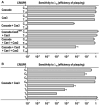Small CRISPR RNAs guide antiviral defense in prokaryotes
- PMID: 18703739
- PMCID: PMC5898235
- DOI: 10.1126/science.1159689
Small CRISPR RNAs guide antiviral defense in prokaryotes
Abstract
Prokaryotes acquire virus resistance by integrating short fragments of viral nucleic acid into clusters of regularly interspaced short palindromic repeats (CRISPRs). Here we show how virus-derived sequences contained in CRISPRs are used by CRISPR-associated (Cas) proteins from the host to mediate an antiviral response that counteracts infection. After transcription of the CRISPR, a complex of Cas proteins termed Cascade cleaves a CRISPR RNA precursor in each repeat and retains the cleavage products containing the virus-derived sequence. Assisted by the helicase Cas3, these mature CRISPR RNAs then serve as small guide RNAs that enable Cascade to interfere with virus proliferation. Our results demonstrate that the formation of mature guide RNAs by the CRISPR RNA endonuclease subunit of Cascade is a mechanistic requirement for antiviral defense.
Figures




Comment in
-
Molecular biology. Secret weapon.Science. 2008 Aug 15;321(5891):922-3. doi: 10.1126/science.1162910. Science. 2008. PMID: 18703730 Free PMC article. No abstract available.
References
-
- Barrangou R, et al. Science. 2007;315:1709. - PubMed
-
- Mojica FJ, Diez-Villasenor C, Garcia-Martinez J, Soria E. J Mol Evol. 2005;60:174. - PubMed
-
- Pourcel C, Salvignol G, Vergnaud G. Microbiology. 2005;151:653. - PubMed
-
- Bolotin A, Quinquis B, Sorokin A, Ehrlich SD. Microbiology. 2005;151:2551. - PubMed
-
- Godde JS, Bickerton A. J Mol Evol. 2006;62:718. - PubMed
Publication types
MeSH terms
Substances
Grants and funding
LinkOut - more resources
Full Text Sources
Other Literature Sources
Molecular Biology Databases
Research Materials

